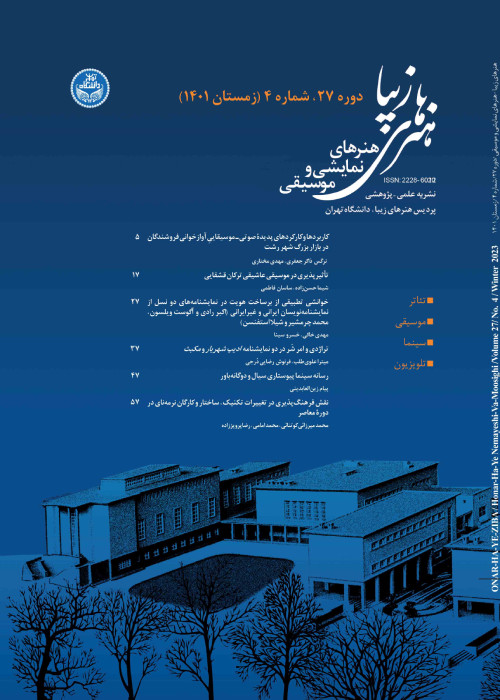Reflection of Kierkegaard's "Knight of Faith" in Henrik Ibsen's "Brand"
Author(s):
Article Type:
Research/Original Article (دارای رتبه معتبر)
Abstract:
This article assumes that examples of the characters described by philosophers to explain their ideas can be found in the world of drama. Soren Kierkegaard, the Danish thinker, mystic and one of the most important Christian writers of modern times and originator of existential philosophies, is regarded as the father of religious thinking. Kierkegaard's main concern is the human realm, which is concerned with human life and how it evolves. He reminisces this state as ‘Existence’ meaning for this state to be the source of decisions, choices, actions, and self-awareness. Existence is a tangible being and Individual of a single person. Kierkegaard believes that Existence can be salvation just by faith, but faith is inward and a kind of passionate attachment that is not possible to open that area by the criteria of knowledge. Faith is trust, certainty, submission and silence before God. Kierkegaard identifies Abraham as the knight of faith and man as the model of the religious sphere. Kierkegaard introduces three main options or stages in order to give meaning to human life and calls them "spheres of life". The last sphere is the religious stage in which the individual lives neither for himself nor for society, but for God. A view derived from the idea of Christianity, in which the believer must go through everything in order to face God. Kierkegaard`s The Knight of Faith is someone who has been tested through all of these levels and degrees throughout his life. He is a human pattern who has found the way to the truth of life and its meaning and has reached the highest level of existence in the face of death thus signifying the release of the believer's soul. Henrik Ibsen is a renowned nineteenth-century Norwegian poet and playwright who is considered one of the most influential artists in the field of theater and has the title of "founder of modern theater”. He was the first to achieve all the goals of Realism and to create a new era in theater. Ibsen’s early works include poetic and romantic plays about the Scandinavian past. Brand is one of the most important plays of this period, a dramatic poem about uncompromising idealism whereby the protagonist sacrifices everything for himself. Ibsen, in this symbolic play, has created a character in the world of drama who has the same characteristics as Kierkegaard`s The Knight of Faith. In this script, Ibsen introduces a priest named Brand, who ultimately in an Abrahamic way achieves true happiness through belief in God and surrenders to Him, in spite of losing all his worldly wealth and even his spiritual possessions in the mortal world. So the main question of the article is how to find an example for Kierkegaard`s The Knight of Faith in the world of drama. In this research, the commonalities of Brand and Kierkegaard`s opus are examined in order to prove that Ibsen's ideal hero is the continuation of Kierkegaard`s philosophy and symbolic similarity of the two works.
Keywords:
Brand , Ibsen , Knight of faith , Kierkegaard , death
Language:
Persian
Published:
Honar-Ha-Ye-Ziba: Honar-Ha-Ye Mosighi Va Namayeshi, Volume:26 Issue: 70, 2021
Pages:
5 to 12
magiran.com/p2323381
دانلود و مطالعه متن این مقاله با یکی از روشهای زیر امکان پذیر است:
اشتراک شخصی
با عضویت و پرداخت آنلاین حق اشتراک یکساله به مبلغ 1,390,000ريال میتوانید 70 عنوان مطلب دانلود کنید!
اشتراک سازمانی
به کتابخانه دانشگاه یا محل کار خود پیشنهاد کنید تا اشتراک سازمانی این پایگاه را برای دسترسی نامحدود همه کاربران به متن مطالب تهیه نمایند!
توجه!
- حق عضویت دریافتی صرف حمایت از نشریات عضو و نگهداری، تکمیل و توسعه مگیران میشود.
- پرداخت حق اشتراک و دانلود مقالات اجازه بازنشر آن در سایر رسانههای چاپی و دیجیتال را به کاربر نمیدهد.
In order to view content subscription is required
Personal subscription
Subscribe magiran.com for 70 € euros via PayPal and download 70 articles during a year.
Organization subscription
Please contact us to subscribe your university or library for unlimited access!



